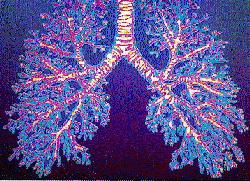 |
STEROIDS QUESTIONS & ANSWERS |
©Priory Lodge Education Limited, 1997
 |
STEROIDS QUESTIONS & ANSWERS |
Professor Peter Barnes, Professor of Thoracic Medicine, National Heart and Lung Institute, UK
A. If you have a strong suspicion that your patient has COPD
rather than asthma (smoking history, progressive shortness of
breath), then you should slowly reduce the dose of inhaled
steroids (over several months - e.g. 25% reduction every 2-3 months).
In most patients with COPD you will be able to withdraw the inhaled steroid
completely, without any increase in symptoms or change in lung
function.
Q. What is a recommended 'steroid trial' for
COPD?
A. The most frequently used regime for a steroid trial is to
give oral prednisolone (40mg daily in a single morning dose) for
2 weeks. It is best to make measurements of peak expiratory flow
(PEF) twice a day for 2 weeks before starting oral steroids in
order to get a baseline value and then during the treatment
period. FEV, should be measured at the beginning and end of the
baseline period and after the inhaled steroids. A steroid trial
is considered positive if FEV, or mean PEF increase by more than15%,
when a diagnosis of asthma is made. It is important to remember
that some patients will have asthma and COPD at
the same time.
Q. What is the role, if any, for oral steroids in
COPD?
A. Oral steroids are used in a formal trial of steroids and may
be useful in acute exacerbations of COPD. They should not be used
as a maintenance treatment because of the side effects of long-term
steroid therapy.
Q. With a newly diagnosed COPD patient should I
initiate steroid therapy, if so how?
A. If a patient has COPD with no evidence of response to oral
steroids (negative steroid trial) then inhaled steroids should
not be used. It is possible that inhaled steroids may alter the accelerated annual
rate of decline in lung function with age.
Q. How will I know if a COPD patient is
benefiting from steroid therapy?
A. The best way to determine whether inhaled steroids are
beneficial is to slowly reduce the dose. If FEV, or mean PEF show
no deterioration, the inhaled steroid can be completely
withdrawn.
Q. Will COPD patients need to be on long-term
steroid therapy? If so, what about side effects?
A. Only patients who have shown a positive response to oral
steroids (steroid trial) should be on inhaled steroids. Many patients
are put on high dose inhaled steroids as they do not respond to conventional
'asthma' therapy and have severe airflow obstruction. This may
result in systemic effects such as skin fragility and might
contribute to osteoporosis. Inappropriate prescribing of inhaled
steroids will also prove expensive.
Q. Should Mild, Moderate and Severe COPD patients
be treated differently with regards to steroid therapy?
A. The same considerations apply to all patients with COPD, irrespective of the severity of airway obstruction.